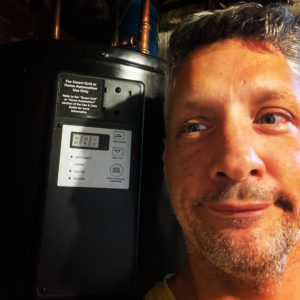
When we moved in to our home in the early 2010’s we had three natural gas (methane) powered appliances, our boiler, our stove, and our water heater. We do have radiators for heating, and though we have augmented our heating with mini-splits so that our boiler acts as more of a base load allowing for adjustments to be made in individual rooms with the mini-splits, it will still be challenging to replace the boiler with an electric option at this point. I do regret not just jumping in with an induction stove when we needed to replace the very broken one the house came with, but the stove is definitely next up for replacement, especially if these this style with batteries takes off. But the water heater was recently nearing the end of its life and in October of 2021 we replaced it with a heat pump! I am very happy with this decision and will let you know why.
Well, of course, burning methane is bad for the climate. While pipelines shouldn’t leak, the fact is that they do, and all of the methane that leaks warms the planet, 80 times more than carbon dioxide does. Besides that methane released into the atmosphere, especially ones home is being found to be more harmful to our health than previously realized. And to top it off the expectation is that in our more turbulent, yet connected world, methane will become an increasingly expensive fuel to use. We want to get off the gas.
One good thing is that even at the time there were programs to help offset the upfront cost of our new heat pump water heater. In Maryland, through the Empower program, Pepco offered a $700 credit for our new, efficient, heat pump water heater. Since then, Congress passed the Inflation Reduction Act, which will come with additional rebates that will be provided by the Maryland Energy Administration for Marylanders and there are also now federal tax incentives. Of course, if you found this from another state, your state may have programs similar to Empower and definitely should have IRA funds coming through. Rewiring America has a great national summary.
But the real question I was interested in addressing in this entry is, what is this change doing to my gas bill? To start I logged into Washington Gas and downloaded all of my available bills and entered the information into a spreadsheet. I definitely wish I had more bills available, but I was able to go back to December 2020. From there I was able to load this data into R and take a look. Here is what the gas usage looks like compared with average Temperature.

We can see that the average temperature between 2021 and 2022 was pretty consistent. We also didn’t change any behavior of note in these two years (e.g., our work from home schedule was consistent, the number of household members did not change). Of course, our heating usage stands out in the winter, but in the summer there really should be no difference between 2021 and 2022. And there is clearly a reduction in our natural gas usage (and it is also clear that the natural gas usage in the summer is more for cooking than water heating). Though I wanted to show this more thoroughly and ran a very simple pre/post linear regression. Here are the results.

So, it appears that installation of our heat pump water heater did indeed have an impact on our gas bill (though certainly not as much as it not being cold). Relying on the coefficient that means we likely would save about $240 on our gas bill because of our change, and that doesn’t even consider the positive externalities on our health (though the stove would have more of an impact than the water heater given that the water heater is hidden away in the basement). I did start looking at our electric bill as well since there will be an increase electricity usage, but there are much more complexities given the much larger number of appliances that use electricity and that, due to the mini-splits, we cannot rely on temperature as clean of an explanatory variable for our electricity usage. Maybe we will have to by a Sense to answer more questions.
